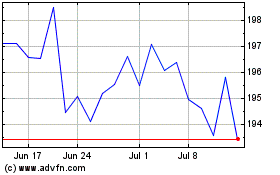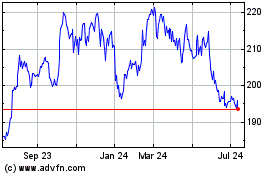2nd UPDATE: Deutsche Boerse, NYSE Euronext Outline Tie-Up
February 15 2011 - 11:39AM
Dow Jones News
Deutsche Boerse AG (DB1.XE) and NYSE Euronext (NYX) on Tuesday
outlined plans for a combination that would create the world's
largest exchange operator, but would face hurdles in winning
support from regulators and lawmakers and overturning investor
skepticism about forecast synergies.
The companies aim to close a transaction by year-end that would
see Deutsche Boerse shareholders own 60% of the merged entity in an
all-stock deal that offers NYSE Euronext shareholders a 10% premium
to its undisturbed share price.
Sensitive issues such as the name of a new Amsterdam holding
company remain under discussion, and though the proposed deal is
seen as accretive to both from the outset, scant details were
provided about reaching the pledged synergy targets.
The plan first leaked last week is the sixth attempt by Deutsche
Boerse to close a transformative deal in as many years, including
two prior efforts to tie with NYSE Euronext.
The plan comes amid another spurt of consolidation in the
sector, with analysts not ruling out an effort to break up the
planned combination, including speculation that CME Group Inc.
(CME) and Nasdaq OMX Group Inc. (NDAQ) could team up to bid for
NYSE and split its derivatives and equities business between
them.
CME said in a statement Tuesday that it was committed to
"organic" growth and building shareholder value. Nasdaq has
declined comment.
The Deutsche Boerse-NYSE Euronext proposal calls for one of the
German group's shares to be exchanged for one share of the new
company's stock, while each share of the Big Board owner will be
swapped for 0.47 share of the new company stock.
"The increasing globalization and interconnectedness of capital
markets, and the rapidly growing presence of alternative trading
venues that operate with less transparency and far fewer regulatory
requirements, will position the new company as a true global
player," NYSE Euronext Chief Executive Duncan Niederauer said.
Niederauer will be CEO of the new company, while Deutsche Boerse
CEO Reto Francioni will be the chairman. In addition to Niederauer
and Francioni, 15 directors will join the 17 member, one-tier
board.
An executive committee will be led by Niederauer with four
members representing each exchange. From Deutsche Boerse, Andreas
Preuss will become deputy CEO and president as well as head of
derivatives. Gregor Pottmeyer will become chief financial officer,
Jeffrey Tessler will lead settlement and custody operations, Frank
Gerstenschlaeger will lead the company's market data and analytics
operations.
Key board members from NYSE Euronext will include Dominique
Cerutti as head of technology services and IT, Lawrence Leibowitz,
who will head cash trading and listings and John K. Halvey, who
will become general counsel.
Joint headquarters will be located in New York City and
Eschborn, near Frankfurt.
The companies didn't provide a name for the new company but said
they expect to register a newly formed Netherlands-based holding
company, Alpha Beta Netherlands Holding N.V.
Deutsche Boerse and NYSE are expected to postpone announcements
on a new name, technology implementation and potential job cuts
amid concerns from regulators and politicians on both sides of the
Atlantic.
New York Senator Charles Schumer voiced concerns over the
weekend that a merger could result in lost influence for NYSE,
particularly if a new name for the merged company emphasized
Deutsche Boerse's majority ownership. Labor representatives from
Deutsche Boerse have also said that a U.S.-based CEO could result
in lost jobs and resources for Germany-based staff.
In addition to regulatory approval, sealing the deal will
require that a majority of NYSE Euronext shareholders controlling
outstanding shares provide approval. Additionally, 75% of Deutsche
Boerse shareholders will have to confirm the deal.
Together the two companies earned pro forma 2010 net revenue of
EUR4.1 billion and earnings before interest, taxes, depreciation
and amortization, or Ebitda, of EUR2.1 billion.
The deal is expected to result in EUR300 million in annual
revenue synergies, achieved after three years. Around 25% of
synergies will be achieved after one year, with 50% acquired after
two years. The deal will immediately lift adjusted earnings of both
companies.
Around 25% of estimated cost savings will be reached after one
year, rising to 50% in the year after and achieving full synergies
three years after merging, the companies said.
Deutsche Boerse and NYSE Euronext revealed last week that they
were in advanced discussions on a potential combination. The deal
creates the world's biggest exchange group for trading stocks and
futures contracts, with a commanding position in stock listings and
market technology.
The merger was seen as driven by the potential to create a
globally leading derivatives franchise, combining heavily traded
fixed-income and equity-index futures across the exchanges'
European markets. Smaller and more nimble platforms geared toward
automated share-trading have cut into the profitability of both
NYSE Euronext's and Deutsche Boerse's stock markets.
NYSE Euronext last week said its fourth-quarter profit declined
by one-fifth from a year earlier, hurt by a dollar that
strengthened against the euro and by weak trading volume in both
the U.S. and Europe.
--Nathan Becker contributed to this article.
CME (NASDAQ:CME)
Historical Stock Chart
From May 2024 to Jun 2024

CME (NASDAQ:CME)
Historical Stock Chart
From Jun 2023 to Jun 2024
